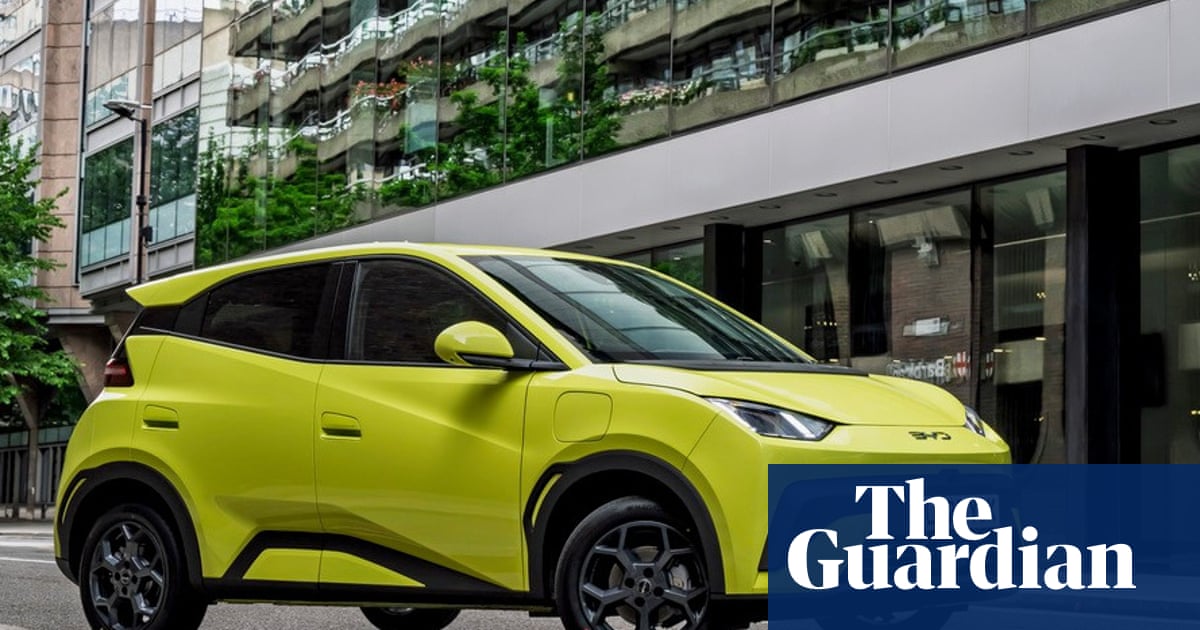The Chinese manufacturer BYD has launched its cheapest model in the UK, in the latest stage of its efforts to overtakeTeslaas the world’s biggest electric carmaker.
The Dolphin Surf will start at £18,650, a price that puts it among the cheapest new vehicles on sale in Britain.
BYD is vying with American rival Tesla, run by Elon Musk, for the crown of world’s biggest battery carmaker, although BYD already beats Tesla when including figures for hybrid cars, which combine a battery with a petrol engine.
The Chinese carmaker registered more pure electric cars than Tesla in Europe for the first time in April. Tesla just about remained the biggest seller of EVs globally in 2024.
Tesla has since been hit by a backlash over Musk’s role in Donald Trump’s administration. Registrations for new Teslas in Europehalved in Aprilcompared with the same month a year earlier. Musk remains the world’s richest man, worth more than $400bn (£295bn), according to Forbes.
Electric cars are alreadymuch cheaper to own than their petrol equivalentsfor most people, but the arrival of smaller models with a comparable sticker price to fossil fuel cars is seen as important in persuading lower-income buyers.
Analysts suggest that BYD has a lot of room to cut the price of the Dolphin Surf further. The company sells a near-identical model under the Seagull name inChinafor about £6,000, although Chinese safety regulations are significantly less onerous.
The company’s European growth has come despite the EU imposing17.4% tariffs on BYDon the grounds of allegedly unfair state aid from China.
In contrast, the UK has not added tariffs on Chinese electric cars, and has therefore been the biggest target market for Chinese brands. BYD sells through a network of dealerships across Britain.
The UK accounted for 30% of all Chinese electric models sold in Europe in March, according to Matthias Schmidt, an electric vehicle analyst, with brands like Xpeng, Leapmotor and Jaecoo, owned by state-controlled Chery also trying to win market share.
Sign up toBusiness Today
Get set for the working day – we'll point you to all the business news and analysis you need every morning
after newsletter promotion
Schmidt has cautioned against writing off European carmakers, who already have several smaller cars on sale, and more on the way. The cheapest electric car on sale in the UK is the Dacia Spring, which costs £14,995, although its official range is only 140 miles. The Citroën ë-C3 starts at £18,305, while Renault’s well-received 5 model starts at £22,995.
The Dolphin Surf has an official range of up to 137 miles, but also has some features that are generally found on more expensive models, such as a rotating touchscreen and driver assistance functions like intelligent cruise control and automatic emergency braking.
BYD has taken a deliberate decision to offer much of the same technology on lower-end models as are found in its premium vehicles, in an effort to drive down the cost of sensors and software whilemaintaining its lead over rivals.
The Surf uses BYD’s Blade battery, which relies on lithium iron phosphate (LFP) for its cathode. LFP batteries are made from cheaper materials than lithium batteries that use more expensive nickel, manganese and cobalt (NMC) – although the latter offer better performance such as longer range.
While carmakers in Europe have until now mostly focused on NMC batteries to help assuagerange anxietyamong early adopters, LFP batteries have proved to be hugely popular among Chinese buyers looking for a cheaper upfront cost. More than 80% of electric cars sold in China in 2024 used LFP batteries, according to data cited by Kallanish Commodities, an industry news provider.
BYD’s main Chinese battery rival,Contemporary Amperex Technology Co Limited(Catl), has also invested heavily in LFP technology in the race to dominate the global electric vehicle industry. Both companies are also competing to offer full recharging in minutes.
